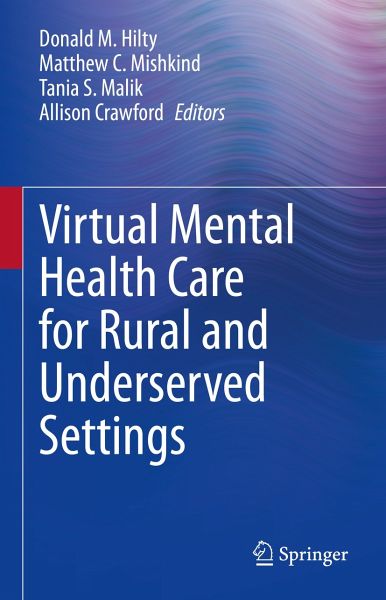
Virtual Mental Health Care for Rural and Underserved Settings (eBook, PDF)
Versandkostenfrei!
Sofort per Download lieferbar
68,95 €
inkl. MwSt.
Weitere Ausgaben:

PAYBACK Punkte
34 °P sammeln!
This book focuses on the critical area of delivering mental health services in rural settings. It is designed as a practical guide to the technological provision of timely, effective, evidence-based care, helpful to the novice and the experienced practitioner alike.The benefits of this approach are:Improved access to and improved quality of careTechnical support for providers and administratorsA means of providing missing specialty careAn ability to maximize scarce resources and significant flexibility for health service delivery.The book will cover how to adjust therapeutic skills to patients...
This book focuses on the critical area of delivering mental health services in rural settings. It is designed as a practical guide to the technological provision of timely, effective, evidence-based care, helpful to the novice and the experienced practitioner alike.
The benefits of this approach are:
The book will cover how to adjust therapeutic skills to patients' needs, models of care and the particular technology used. It shows how rudimentary design of workflow can assist in integrating care, and highlights the importance of allowing for cultural needs (both rural geography and ethnic/race). Administrative issues are also addressed (e.g., privacy, reimbursement). The chapters are short and designed for maximum practicality, including learning objectives, cases and summaries emphasizing "what to do and how to do it."
The benefits of this approach are:
- Improved access to and improved quality of care
- Technical support for providers and administrators
- A means of providing missing specialty care
- An ability to maximize scarce resources and significant flexibility for health service delivery.
The book will cover how to adjust therapeutic skills to patients' needs, models of care and the particular technology used. It shows how rudimentary design of workflow can assist in integrating care, and highlights the importance of allowing for cultural needs (both rural geography and ethnic/race). Administrative issues are also addressed (e.g., privacy, reimbursement). The chapters are short and designed for maximum practicality, including learning objectives, cases and summaries emphasizing "what to do and how to do it."
Dieser Download kann aus rechtlichen Gründen nur mit Rechnungsadresse in A, B, BG, CY, CZ, D, DK, EW, E, FIN, F, GR, HR, H, IRL, I, LT, L, LR, M, NL, PL, P, R, S, SLO, SK ausgeliefert werden.












